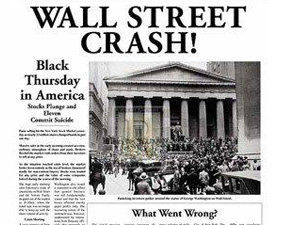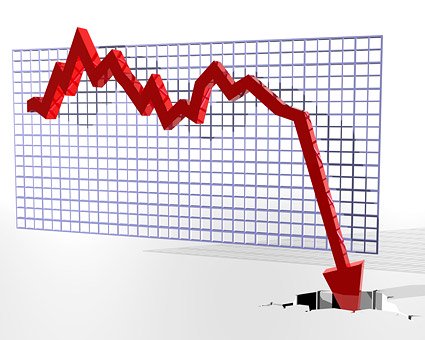Stock Market Crash - how do I cope?
10 valuable tips

Knowing how to cope with a stock market crash can save you (or make you) a fortune in your investment portfolio. It is perhaps the most important time to be informed and rational in how you react.
Never forget that stock price collapses do happen. They have always be around and you can expect them to happen several times over your investing lifetime.
How should you cope with a stock market crash?
Tips to Cope With A Stock Market Crash
Tip #1 Expect them to happen

Before looking at specific tips, you must always be prepared for a stock market crash. Large drops (>20%) in stock markets can come at any time and often without warning.
At the start of 2020, hardly anyone was aware of the coronavirus spreading rapidly in Wuhan, China but six months down the line, it had caused most major markets to drop by at least 30%.
As Warren Buffett says, "If you stick around long enough, you'll see everything in markets".
Tips to Cope With A Stock Market Crash
Tip #2 NEVER EVER buy securities on margin.

We've mentioned this several times on this site but is worth reiterating again. If you borrow to purchase stocks you may well end up in negative equity when prices fall. This is too big a risk to take as you may be unable to fund the interest payments on the borrowings and be forced to sell, thus realising a loss (bad enough) and having to pay interest for the privilege.
This is a disaster.
Obviously borrowing to invest can increase your upside in the good times, but being forced to sell will cost you more in the long run.
Tips to Cope With A Stock Market Crash
Tip #3 Do everything you can to avoid being a forced seller
The next worst thing to buying on margin, then being forced to pay on top of your losses, is to have to sell at the worst point in the market. This is what emotional investors are tempted to do, but doing so crystallizes the losses you see on your broker account for ever and you may feel you never to buy another stock ever again.
When the markets rise, however, you feel more confident you probably will re-invest either directly or through a pension scheme and you have unwittingly sold low and bought high which will cost you dearly.
Tips to Cope With A Stock Market Crash
Tip #4 Build up savings to create your own financial "moat"
If you own a stock portfolio and have no savings you're walking a tightrope, always one step from disaster. To get away from this you have to make sure you always have enough cash to where you do not need to sell securities to live. Always imagine the worst happening.
Stock market crashes frequently coincide with economic downturns. At these times you could lose your job. In the COVID lockdown we've even seen entire economies shutdown. This has led to many businesses receiving zero revenue and therefore they are cutting their dividends. So you could well lose salary income and dividend income.
In 1915, the stock market even closed for around six months. Remember ANYTHING can happen and it can be very surprising. Make sure you have enough cash set aside so you don't need to touch your investments. Analysts talk about the width of a company's financial "moat", the protective barrier against an economic downturn. Ideally each individual would have a moat of savings too.
The width of your moat - the amount of savings you have depdends on your circumstances - predominantly on how secure your job is, you should ideally have 6-12 months' worth of expenditure set aside at all times. Always keep that cash ready for a rainy day so you are not forced to sell investments.
Tips to Cope With A Stock Market Crash
Tip #5 Remember your business owner mentality
Your stock holdings give you the status of part owner of many businesses. If you can fully view yourself as a business owner, then stock market price moves should not bother you as much as if you were a mere speculator. Just because stock prices have fallen does not mean that the fundamental earning power of the businesses in your portfolio has fallen and that is what you should be focused on.
Ben Graham famously said that "The market is there to serve you, not to instruct you". To the genuine business owner, market prices are largely irrelevant unless you have to deal. So the main theme of these tips is to make sure you don't have to deal following a crash...
Tips to Cope With A Stock Market Crash
Tip #6 Focus on the business rather than the stock price
Remember that when you're buying a stock, you're buying a piece of that business. Your fortunes over a long peiod of time will more
or less reflect the fortunes of that business. When you own a business, you'll have good and bad periods. You should treat a stock like
buying an apartment. If you bought an apartment, you would not call up the broker the following week and ask for another quote. If the
broker called you and offered you 10% lower, you would not need to act. All you would worry about is the quality of the home and the people
you rent it to. Can you lift the rents at least at the rate of inflation every year? That's what you should worry about.
It is the same when you buy a stock. The market is constantly throwing "quotes" in the form of the prices at you but you are free to ignore those quotes. What you should worry about is how the business is performing. Are revenues and earnings going up? Is the balance sheet strong? Do management treat the shareholders well? Is it producing high returns on equity? What is the competition doing? etc etc.
Sometimes there will be a material downturn in the business. Clearly when this happens then the business may well be worth less. Your job is to try and determine if this is permanent or temporary. For example, if you own stocks in an insurance company then you know that every few years their earnings will be hit badly by natural events. If that company has been pricing the risk correctly and manages their balance sheet well then this hit should be temporary.
That said, the downturn in a camera business such as that which hit Kodak as people shifted to taking digital photos on their smartphones was permanent. Shareholder value would never recover here.
The 2020 COVID-19 crash is unique in many ways because so many businesses had to completely shut down. Clearly this is hurting the value of their business as no cash comes in.
The question, though, is whether your holdings can restore their earning power over the next few years while NOT hurting existing shareholders with capital raisings at distressed share prices. This final point illustrates the importance of a strong balance sheet which we discuss more below.
Tips to Cope With A Stock Market Crash
Tip #7 Look for companies with strong balance sheets
Stock market crashes emphasize the importance of balance sheet strength.
We strongly recommend that the companies you in vest in have a strong balance sheet. This means little or no debt or other liabilities.
The reason why is because bad things can (and do!) happen. Look at the outbreak of Coronavirus and the resulting shutdowns. Many businesses have had to completely close. Their revenues went to zero (or near enough). If the businesses you own have a lot of debt to repay then you are at the mercy of the lenders. Many of those lenders are having their loans impair so they are unlikely to be as generous as in more prosperous times. At the very time you need banks to be kind, they are LESS likely to help you.
The only other option is to raise equity. This means selling shares. Well guess what - share prices of those companies have probably nose-dived.
This means that if the company is lucky enough to be able to sell equity then, as the prices are so low, current shareholders will be diluted enormously. None of this is good for your existing wealth.
Therefore, companies with strong balance sheets are much more likely to ride out the tough times without having to raise capital. Their share prices may drop but if they can restore their former earning power then this is of no concern to you. In fact, it may well be chance for you to buy more assets at more attractive prices, which leads us onto...
Tips to Cope With A Stock Market Crash
Tip #8 See lower prices as good news

It never ceases to amaze how people get into blind panic as soon as prices start falling. They sell their shares, crystalize losses and vow never to "invest" in stocks again. This is why so many people perform so poorly in the stock market.
You need to treat stocks like anything else. If the price of going to the movies drops then you'd be more likely to go. It is the same with stocks - if prices drop then you are getting more for your money and they should be more attractive to you. Remember, the lower the price you pay, the HIGHER your future returns will be.
As mentioned above, clearly you should ALWAYS be careful. Sometimes stocks drop for a very good reason and if that reason is permanent loss of earning power then you may not be better off buying. But if stocks are selling off indiscriminately and you have a long time horizon (which you always should) then stock market falls are GOOD news. The only time they are bad news is if you are looking to sell but most readers of this site are likely to be savers and therefore net buyers.
Stock market falls should therefore be WELCOMED by you.
Tips to Cope With A Stock Market Crash
Tip #9 Diversification is important
If you owned shares in a well managed/high returning/low debt travel company or airline at the start of 2020 then you would have seen a material reduction in earning power even though you had done nothing wrong. As we mentioned above, BAD THINGS do happen and they can't always be foreseen. Therefore, you really shouldn't put all your eggs in one basket.
If a company you own gets wiped out, you need to make sure this doesn't set you back too much and you can recover. Therefore, you should focus on building up a range of cash generating assets across various sectors/industries, geographies, and different asset classes. This should give you some protection against those unforeseen events.
Tips to Cope With A Stock Market Crash
Tip #10 Keep your head and make a plan
You may not have been ready for the most recent crash, but that doesn't mean you shouldn't be ready for the next one.
The best way to get yourself prepared for a crash is to have a plan either in your head or written down.
Do you sell? (Clue - "no"!)
Do you buy more? (Clue - "yes"!)
Market volatility gives many more opportunities and you need to be alert to them. Having a plan ready in advance will not just give you much-needed calmness when the markets tumble, but should also enable you to see opportunities rationally when others can't. The most important thing is to focus on the facts, think long term, and make sure you are NEVER forced to act (margin calls/lifestyle needs etc).
All the great investors from Buffett, to Lynch/Munger/Marks etc have been at their busiest during turbulent times. They were most likely biding their time before the crash building up cash reserves and with plenty of potential purchases in mind.
Got a BURNING dividend question for 6-figure dividend earner Mike Roberts?
What is it that you really want to know about investing?
Submit a query and Mike will write a page in response.
PLEASE NOTE - in accordance with our terms of use, responses are meant for education / interest only. We do not give specific financial advice.
What Other Visitors Have Said
Click below to see contributions from other visitors to this page...
amount of dividend on an eta? 




If I bought QQQ Dec 2011 with the amount invested as $8,890.00 what would the dividend amount be today?


